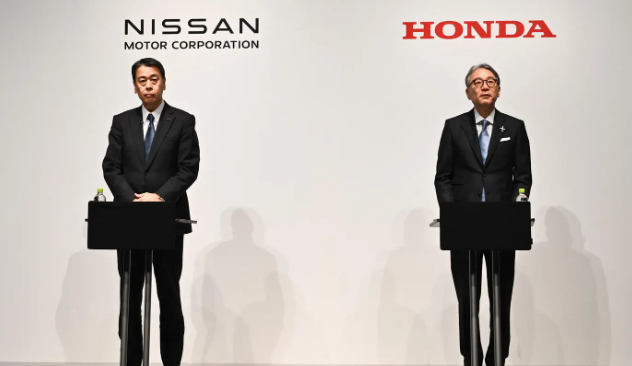Japan’s Nissan and Honda have called off discussions on a potential merger that would have resulted in the world’s third-largest car manufacturer. The two companies, along with their partner Mitsubishi Motors, announced that they would be ending a memorandum of understanding for the proposed deal, according to a statement from Nissan on Thursday.
Moving forward, the companies will continue to collaborate in the area of strategic partnerships, particularly focusing on intelligent and electrified vehicles. Their aim is to create new value and enhance the corporate value of both Nissan and Honda.
Back in December, Nissan and Honda had revealed plans to explore a merger over the next six months, hoping to combine their resources to better compete with the increasing competition from Chinese carmakers. This move was driven by the need to stay competitive as the automotive industry shifts toward electric vehicles. However, after several weeks of talks, progress appeared to stall.
During the negotiations, different options for structuring the business integration were discussed. Honda suggested altering the merger structure from a joint holding company, as originally planned, to a deal where Honda would be the parent company and Nissan would be a subsidiary through a share exchange. Ultimately, both companies decided it was best to cease the discussions.
Nissan has been facing significant challenges since the breakdown of its long-established alliance with French automaker Renault. The company is grappling with severe financial issues, leaving it in urgent need of a stronger partner. Some analysts have even speculated that Nissan could face bankruptcy as early as 2026 when it has a substantial amount of debt due.
Nissan’s profits for the six months ending in September plummeted by 94% compared to the same period in 2023. The company reported losses from its automotive operations and only a small profit from its financing division. In response to these financial struggles, Nissan announced plans to reduce its manufacturing output by 20%, leading to the layoffs of 9,000 employees. Additionally, the company drastically lowered its forecast for the full-year operating profit by 70%.
Intense competition
In addition to its financial difficulties, Nissan, like many traditional automakers, is burdened with significant research and development expenses as it shifts from producing gasoline-powered vehicles to electric ones. This transition is necessary to meet increasingly stringent environmental regulations worldwide.
Nissan has seen some success with its electric vehicle (EV offerings), like the Nissan Leaf, which was even brought up during merger talks. The high costs associated with developing EVs have driven automakers to explore mergers as a way to share the financial burden, according to analysts.
“Nissan is in a difficult spot after the collapse of its $60 billion merger discussions with Honda. The company will likely seek a new partner,” said Lucinda Guthrie, head of Mergermarket, on Wednesday.
“As technology progresses, automakers may need to move toward manufacturing ‘robots on wheels’ rather than traditional combustion engine vehicles. This could mean that Big Tech companies and electronic component manufacturers become crucial partners,” she added.
Foxconn, the Taiwanese electronics maker best known as Apple’s primary supplier, has confirmed its interest in partnering with Nissan. However, Foxconn’s chairman, Young Liu, clarified that the company is not looking to acquire Nissan.
Since 1999, Nissan has been in an alliance with Renault. In January 2023, they agreed to restructure their partnership, with Renault reducing its stake in Nissan to 15%, marking a significant shift in their long-standing collaboration.
The two companies, along with their junior partner Mitsubishi Motors, had previously worked together to share production and technology, ultimately saving billions of dollars annually. However, the alliance began to unravel after the dramatic fall of former chief Carlos Ghosn in 2018.














